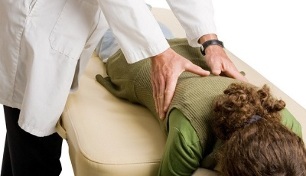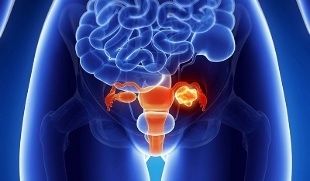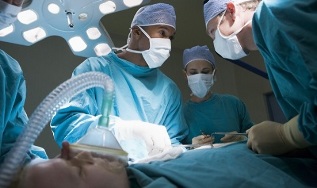
What are u lumbar spinal fibrosis? How to treat lumbar necrosis? And is bone necrosis really untreated?
Considering statistics on the incidence, the number of cases does not decrease every year. Discardial necrosis affects both the young and the elderly. The treatment for lumbar spinal tumors, and the main symptoms of lumbar tumors, will be described in detail by a neurologist or osteopath.
Osteochondrosis is a fairly common disease. Defect refers to the change in shape of the vertebrae and a decrease in the elasticity of the disc due to a lack of nutrition in the cells.
Lumbar spine pain is for a reason. Located in the lower part of the spine, the vertebrae bear the maximum load. When lifting weights, all the force exerted on the body compresses the disc space and leads to compression of nerve roots. From here, signs of lumbar necrosis begin to appear.
Reason
Each type of disease has elements that negatively affect the body. Lumbar spinal cord tumors also have their own causes. Doctors do not rule out the cause, transmission of the disease at the genetic level. It is believed that if parents have a problem with disc malnutrition, there is a high chance that the problem will not overtake the child. One of the most common reasons is heavy manual labor. When lifting weights, most of the load goes to the spine.
Obesity is an equally common cause of illness. Excess weight accumulating in the body puts pressure on the spine and causes pain. It seems that bad posture will not lead to anything serious, but this is also one of the reasons why the disc is worn out, complicating the bone necrosis. Back injuries are very important. Bacterial infections, either due to poorly trained athletes, heavy lifting or inaccurate joint loads are also adversely affected.
The most common cause of malnutrition in disc cells is a sedentary lifestyle.
To keep the body healthy, one needs a moderate load. Completely limited or limited physical activity leads to decreased blood circulation. As a result, the lumbar muscles that do not receive the necessary nutrients become weaker, and the load on the lumbar spine increases. In addition, over the years, the spine becomes no longer as mobile as it was in youth, and the elasticity of the disc decreases, which in turn leads to disease.
Infectious or inflammatory diseases that affect bones or joints, leading to changes in the structure of the vertebrae. Birth defects of the skeleton, or errors in the development of the musculoskeletal system. Flat feet, resulting in destruction of segments of the spine, due to the inability of the limbs to absorb the shock. Most of the load does not fall on the legs, but on the lower back, resulting in segmental distortion. Stressful situations are common causes of various ailments. Therefore, lumbar necrosis and its symptoms are no exception. A strong nerve shock can be the impetus for pinching nerve ends and causing pain. Usually, stress is the cause of bone necrosis in women, they are more emotional than men.
Symptoms
In the early stages of the disease, doctors rarely diagnose. Therefore, it is difficult to identify the main symptoms of lumbar necrosis of the spine. Manifestations of the disease take place gradually.
Since the main manifestation is low back pain, there is a division of pain into 3 groups, which characterize the symptoms and signs of low back pain.
- Low back pain- paroxysmal pain that occurs in response to a sudden movement or lifting weights. When trying to do a different pose, the pain gets stronger, up to the waist.
- Lumbodynia- pain gradually increases and becomes frequent. The muscle fibers and disc cartilage are affected. Low back pain is a consequence of low back pain.
- Paralysis- painful, cold, or hot sensation in the lower back and lower extremities. They arise in response to the compression of the roots of the spinal cord.
The second most important symptom in diagnosis is limited physical activity due to pain sensation. When trying to do a job or exercise routine, a person has increased pain, which can affect the entire leg. Even while sitting, the patient still has a tingling sensation from the lower back to the legs.
Equally important is the local drop in temperature and skin discoloration, becoming dry and pale. Numbness, weakness of the muscles of the lower extremities, indicates disease progression. The most severe phenomenon, manifested in the last degree of lumbar spondylolisthesis, is dysfunction of the pelvic organs. Persistent debilitating pain is associated with urinary incontinence and, or, conversely, delayed excretion.
When diagnosing the disease, there are four stages of the bone necrosis process of the spine. For each stage, symptoms of bone necrosis disease of the lumbar spine are characteristic, exacerbating pain in the sacrum.

As the disease progresses, bone necrosis can descend into the last spine, the coccyx. This disease is called osteonecrosis of the sacral spine. Appearance of acute, paroxysmal pain in the coccyx region. Women suffer the most in this case. The anatomical structure of the body and the age-related changes that contribute to the development of disc osteonecrosis. Osteoporosis in women is often complicated by other medical conditions.
The symptoms of lumbar necrosis are somewhat different from lumbar necrosis.
Symptoms manifest with dysfunction of the pelvic organs, making it difficult to choose the correct treatment and diagnose the cause of the disease.
Signs such as repeated urination, incontinence and stool appear. If the diagnosis is not correct, complications arise.
Stages of the disease
Treatment of lumbar necrosis also varies depending on the stage of the disease.
- first and early stage of the disease, characterized by lumbar-lumbar pain, muscle spasms, local swelling of the skin.
- Second stage, starting with weight loss. The pains become more frequent and intense compared to the early stages. In the spinal joints, abnormal movements may occur, increasing the sensation of pain. Pain sensations along the sciatic nerve. Less commonly, the functions of internal organs may be impaired.
- The third stageis characterized by the appearance of a herniated disc. A deformed spine, curvature can be left or right, this is a scoliosis, scoliosis forward, curvature backward - scoliosis. Therefore, a person is tormented by constant sharp pain.
- Fourth stage, the most difficult. Due to the constant intense pain, the patient has difficulty walking. If treatment is not started in time, a person can become permanently disabled.
Complications
The most common complication is dysfunction of the genitourinary system. Along with uncontrolled urination, urine and feces, inflammation occurs in the genitals - urine and rectum. With a more pronounced damage to the vertebrae, irritation occurs in the direction of the sciatic nerve and its inflammation. A bulging disc is a very dangerous complication. Bud is a boundary condition of the disc, which can lead to further complications if not treated promptly. It occurs due to a passing degenerative change of the spine.
The consequence of a bulge is a herniated disc. Manifested by change in disc shape and rupture of the disc.
Continuous compression of the nerve roots of the spinal cord and inflammation leading to complications such as spinal inflammation.
A complete blockage of the spinal canal may occur. Due to instability of the acupuncture point, men have congestion in the subframe area leading to impotence. In women, this leads to inflammatory diseases of the uterus, ovaries and appendages. From the side of the kidney, this is a pain in the kidney, which cannot be eliminated until treatment of osteonecrosis in the lower back. Paralysis of the lower extremities, which can cause a person to be in a wheelchair. Timely diagnosis and timely treatment of lumbar fibroids help prevent these complications and prevent disability.
Treatment
Analyze lumbar necrosis disease, symptoms and treatment. In modern times, medicine is able to restore a person with bone necrosis. Treatment of spinal necrosis takes a long time. The first time patients with disc osteoporosis will wonder if it is possible to cure the spinal tumors, and how to cure them forever?
What to do? Can lower spine tumors be treated? First you need to completely rethink your lifestyle. Draw certain conclusions. You need to work towards the cherished goal of healing every day without interruption. With bone necrosis disease of the lumbar spine, the complex treatment of the disease is very important. Treatment of osteonecrosis with radiotherapy includes a number of methods.
Conservative
Prudent treatment, based on massage techniques, if done properly, can reduce muscle spasm and improve the nutrition of muscle fibers. By improving the state of temperature, the corset of the back muscles is strengthened. Correctly positioned posture, which determines the appearance of various problems with the spine. Physiotherapy for lumbar necrosis is helpful, but you need to exercise during remission, between exacerbations. Taking part in the acute phase of the disease, you can only worsen the situation and harm your health.
Hand treatment also refers to conservative treatment. It must be performed by an expert specially trained in the technique. Thanks to this therapy, the spine can be returned to the desired position. This is sometimes the most effective method. It is necessary to perform such a procedure in the semi-acute phase.
Dieting, obese people, implementing a healthy lifestyle and adhering to a healthy diet will not harm anyone. And people with such diseases will only benefit. Because of being overweight, this is one of the reasons that lead to the occurrence of osteonecrosis. Physiotherapy is an equally effective treatment. Magnetic therapy, UHF has the ability to treat long-term, improve blood circulation in areas damaged by bone necrosis in the lumbar region. They also have vasodilating and analgesic effects.
Type of drug treatment. How to cure spondylolisthesis with medicine? What disease should be treated, all of these questions are of great concern to the patient. Treatment is divided into two categories. In the first case, in the acute phase of the disc osteonecrosis process, the drug aims to eliminate pain and inflammation. Means are used to release pinched roots of the spinal nerve. These include muscle relaxants, glucocorticosteroids, blockers, NSAIDs. The second period, between exacerbations, takes drugs to improve blood circulation, restore muscles and nerve fibers, damaged body tissues. For this purpose vitamins and preparations of plant and animal origin are used.
To improve blood circulation, vascular preparations are used, as well as warming and anesthetic ointments.
Activity

Neurosurgeons perform microsurgical and laparoscopic operations on the spine.
These methods are more common and are discarded when other treatments fail.
When drug treatment is ineffective and complications such as hernia appear, surgical removal of the damaged disc is indicated.
Disease prevention
Prevention of lumbar spinal necrosis includes the elimination of risk factors for this disease. In order not to have to think about a cure for spondylolisthesis, you need to prevent its occurrence. Eliminating causes is the primary precaution.
Normalizes physical activity, strengthens back muscles, minimizes load on the lumbar spine, prevents the development of diseases that lead to bone necrosis, all of which are preventive measuresprevention to prevent symptoms of osteonecrosis. By following these simple principles, you maintain your health and prolong your life. After all, if you don't adhere to treatment and prevention, you may never return to the full life.





































